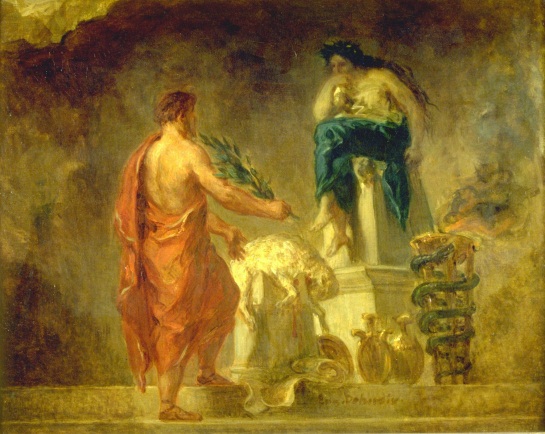
Eugène Delacroix
French, 1798-1863
Lycurgus Consulting the Pythia, 1840s ca.
Oil on canvas
12 15/16 x 16 1/4"
University of Michigan Museum of Art, Museum Purchase
1968/2.75
COMMENTS
The design was used with minor variations for one of the pendentives in the cupola celebrating Legislation and Eloquence in the library of the Palais Bourbon. Louis de Planet painted the pendentive canvas in his studio from Delacroix’s sketch and under his supervision. Delacroix put the finishing touches on it. He brought the sketch to his assistant on 9 December 1843, and de Planet reports in detail his work on the canvas in the following weeks. De Planet’s share of the work had evidently been completed by the beginning of January 1844, when he moved on the “Ovid” pendentive.
Beetem has drawn attention to the fact that the paint did not originally cover the two bottom corners but followed the curved shape of the pendentives and their sketches; the corners were painted over later, and the curved edges of the original composition can still be faintly seen in photographs. This fact would seem to remove any reasonable doubt that the picture was originally conceived as an exploratory oil sketch for the pendentive, no later than December 1843; but, being signed and of rectangular format, it is an independent variant. Delacroix may have singed it and given it to Francis Petit, leaving it in a somewhat sketchier state than is now is and certainly without filling in the lower corners, which can be seen to be barer than they now are in the reproduction in “Catalogue Collection Donatis” 1897. Paint may have been added later by a foreign hand, not only in the corners but also, for example, in the highlights of Lycurgus’ back and the sacrificial beast, more lamb than the goat of the pendentive.
- Lee Johnson, The Paintings of Eugène Delacroix, A Critical Catalog, v. III, Oxford, Clarendon Press, 1986, pp. 104-5
SBMA CURATORIAL LABELS
Delacroix initially developed this composition in conjunction with the decoration of the library in the Palais de Bourbon. In antiquity, Lycurgus was credited with establishing Spartan law. He traveled to Delphi to consult the oracle as to the durability of the laws he was about to propagate. As narrated by the ancient author Herodotus, 1.65.3, "As soon as he entered the great hall of the temple, the Pythian priestess said to him: 'So you have arrived at my rich temple, Lycurgus, you who are dear to Zeus and to all who have their homes on Olympus! I ask myself whether I shall call you a god or a man in my prophecy, but I think rather that you are a god, Lycurgus.‘" The public decorations often spun off multiple variations such as this one, which Delacroix would then sell as independent works of art.
- Delacroix and the Matter of Finish, 2013
